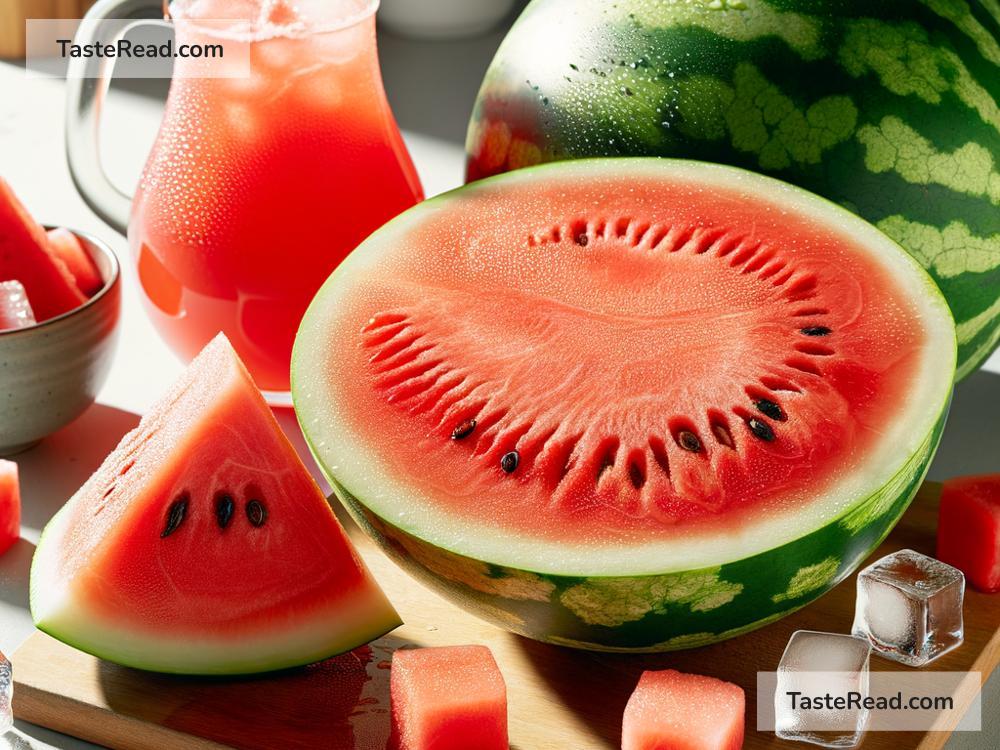The Science Behind Watermelon’s Hydration Properties
Watermelon is often hailed as the ultimate summer fruit, and for good reason. Its sweet, refreshing taste and vibrant color make it a favorite for picnics, barbecues, and poolside snacks. But watermelon is more than just delicious—it’s a hydration powerhouse! Ever wondered why eating watermelon feels as refreshing as drinking a cold glass of water? Let’s take a look at the science behind this amazing fruit and why it’s so good at keeping us hydrated.
Packed with Water
Watermelon lives up to its name because it’s made mostly of water! In fact, about 92% of watermelon is water, which means eating it is very similar to drinking fluid. When you bite into a juicy slice of watermelon, you’re not just satisfying your taste buds—you’re giving your body a much-needed dose of hydration.
Staying hydrated is crucial, especially in hot weather when we lose more fluids through sweating. Water plays a critical role in maintaining body temperature, aiding digestion, and even lubricating joints. While drinking water is obviously important, eating hydrating foods like watermelon is another great way to boost your fluid intake. It’s hydration you can chew!
Electrolytes: Nature’s Rehydration Helpers
Watermelon doesn’t just provide water—it also contains electrolytes, such as potassium and magnesium. Electrolytes are minerals that help balance the fluid levels in your body, and they’re essential for proper muscle function, nerve signaling, and overall hydration.
When we sweat, we lose not only water but also electrolytes. That’s why athletes and fitness enthusiasts often turn to sports drinks for rehydration. However, watermelon offers a natural way to replenish electrolytes without added sugars or artificial ingredients. It’s like nature’s own sports drink in the form of a juicy snack!
The potassium in watermelon is especially beneficial because it helps regulate sodium levels and keeps the body’s fluid balance in check. This makes watermelon a great choice for combating dehydration on hot days or after exercising.
A Treasure Trove of Nutrients
In addition to water and electrolytes, watermelon is also packed with essential nutrients that promote overall health. For instance, it contains vitamin C, which supports a healthy immune system, and vitamin A, which boosts skin and eye health.
One of the key compounds in watermelon is lycopene, a powerful antioxidant that gives the fruit its red color. Lycopene is known for its ability to fight free radicals, which are unstable molecules that can damage our cells. Studies suggest that lycopene may have benefits for heart health, skin protection, and cancer prevention. So, while watermelon is hydrating your body, it’s also supporting your overall wellness.
Another important nutrient is citrulline, an amino acid found abundantly in watermelon. Citrulline helps improve blood flow and may reduce muscle soreness after physical activity. This unique amino acid makes watermelon particularly appealing to athletes looking for a snack that’s both hydrating and functional.
Fiber for Absorption
While watermelon’s high water content is great for hydration, its fiber content plays an important role too. The small amount of fiber in watermelon (about 1 gram per cup) helps slow down the absorption of water into the body. This means that the hydration from watermelon lasts longer, providing a more sustained benefit than drinking plain water alone.
Fiber also supports healthy digestion by promoting regular bowel movements and feeding the friendly bacteria in your gut. In short, watermelon’s combination of water and fiber not only hydrates but also helps keep your digestive system happy and functioning smoothly.
Cooling Effects
Eating watermelon doesn’t just hydrate you—it can also help you cool down. The fruit has a naturally low calorie density and a refreshing, cooling effect on the body. Many cultures even associate watermelon with reducing “heat” in the body. Because it’s so hydrating and light, watermelon improves circulation and helps regulate body temperature, making it a perfect snack for summer days when the sun is blazing.
Eating Watermelon the Right Way
You don’t need to eat an entire watermelon to reap its hydration benefits (although no one’s judging if you do!). A single cup of diced watermelon contains about 150 milliliters (5 ounces) of water, along with all the other nutrients we’ve listed. That makes it easy to add watermelon to your diet in a variety of ways, such as:
- Enjoying it fresh as a snack.
- Blending it into smoothies for a tasty, hydrating drink.
- Mixing it into salads with cucumbers, mint, and feta cheese.
- Freezing it into popsicles for a cooling treat.
Conclusion
Watermelon isn’t just a fun summer fruit—it’s a scientifically proven hydration hero. Its high water content, electrolytes, nutrients, and fiber make it one of the best foods for staying hydrated and healthy. Next time you munch on a slice of watermelon, remember that you’re doing your body a favor by giving it both hydration and an array of health benefits.
So, whether you’re lounging by the pool or recovering after a workout, reaching for watermelon is a refreshing and smart way to keep your body cool, hydrated, and energized. What’s not to love?


